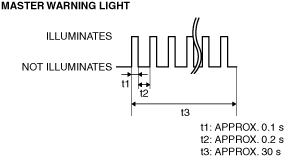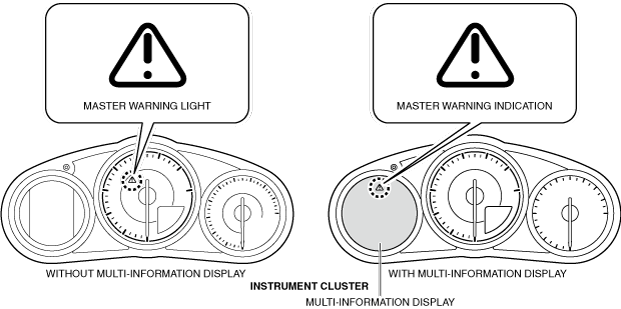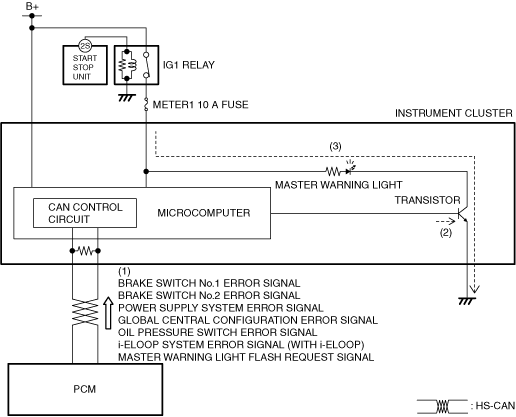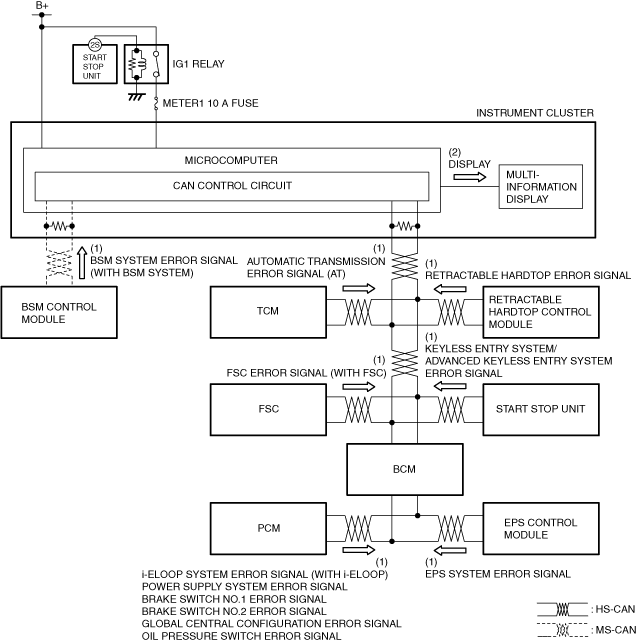MASTER WARNING LIGHT/MASTER WARNING INDICATION
id092200043000
Purpose
• The master warning light (without multi-information display)/master warning indication (with multi-information display) warns the driver that any of the following malfunctions is occurring.
Without multi-information display
-
― Brake switch malfunction
― Power supply system malfunction
― Global central configuration error
― Oil pressure switch malfunction
― i-ELOOP system malfunction (with i-ELOOP)
With multi-information display
-
― i-ELOOP system malfunction (with i-ELOOP)
― Electric power steering (EPS) system malfunction
― Keyless entry system/advanced keyless entry system malfunction
― Automatic transmission malfunction (AT)
― Power supply system malfunction
― Brake switch malfunction
― Retractable hardtop malfunction
― Forward sensing camera (FSC) malfunction (with forward sensing camera (FSC))
― Blind spot monitoring (BSM) system malfunction (with blind spot monitoring (BSM) system)
― Global central configuration error
― Oil pressure switch malfunction
Functions
Without multi-information display
-
• The instrument cluster turns the master warning light on based on the following CAN signals:
|
Signal name
|
Sending module/part name
|
Communication method
|
|
Brake switch No.1 error signal
|
PCM
|
HS-CAN
|
|
Brake switch No.2 error signal
|
|
Power supply system error signal
|
|
Global central configuration error signal
|
|
Oil pressure switch error signal
|
|
i-ELOOP system error signal (with i-ELOOP)
|
-
• If the cancel procedure for preventing unnecessary operation of the brake override system is implemented, the PCM sends a master warning light flash request signal to the instrument cluster via CAN communication. The instrument cluster flashes the master warning light based on the master warning light flash request signal from the PCM. For the cancel procedure to prevent unnecessary operation of the brake override system, refer to [DRIVE-BY-WIRE CONTROL]. (See
DRIVE-BY-WIRE CONTROL [SKYACTIV-G 1.5, SKYACTIV-G 2.0].)
• The master warning light flashes in the pattern shown in the figure.
With multi-information display
-
• The instrument cluster displays the master warning indication on based on the following CAN signals:
|
Signal name
|
Sending module/part name
|
Communication method
|
|
i-ELOOP system error signal (with i-ELOOP)
|
PCM
|
HS-CAN
|
|
Power supply system error signal
|
|
Brake switch No.1 error signal
|
|
Brake switch No.2 error signal
|
|
Global central configuration error signal
|
|
Oil pressure switch error signal
|
|
Electric power steering (EPS) system error signal
|
Electric power steering (EPS) control module
|
|
Keyless entry system/advanced keyless entry system error signal
|
Start stop unit
|
|
Automatic transmission error signal (AT)
|
TCM
|
|
Retractable hardtop error signal
|
Retractable hardtop control module
|
|
Forward sensing camera (FSC) error signal (with forward sensing camera (FSC))
|
Forward sensing camera (FSC)
|
|
Blind spot monitoring (BSM) system error signal (with blind spot monitoring (BSM) system)
|
Blind spot monitoring (BSM) control module
|
Construction
• The master warning light is built into the instrument cluster. (without multi-information display)
• The master warning indication is displayed in the multi-information display. (with multi-information display)
• For vehicles with the center display, a warning message in the center display is displayed when the master warning light/master warning indication is turned on or flashed/displayed. For the message content and verification method, refer to the [CENTER DISPLAY]. (See
CENTER DISPLAY [WITH CENTER DISPLAY].)
• For vehicles with the multi-information display, a warning message is displayed in the multi-information display simultaneously with the master warning indication. For the message content and verification method, refer to the [MULTI-INFORMATION DISPLAY]. (See
MULTI-INFORMATION DISPLAY.)
Operation
Without multi-information display
-
1. The instrument cluster turns on (2) the transistor continuously when it receives (1) each error signal via CAN communication from the PCM, and the instrument cluster turns on (2) the transistor intermittently when it receives (1) a master warning light flash request signal.
2. When the transistor is on continuously, the master warning light turns on (3), and if it turns on intermittently, the master warning light flashes (3).
With multi-information display
-
1. When the instrument cluster receives (1) each error signal via CAN communication from the each module, it displays (2) the master warning indication in the multi-information display.
Fail-safe
• Not applicable



